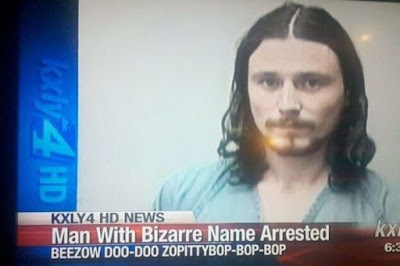In the way that viral nonsense always goes, every few months I see a resurgence of a post (actually a collection of similar posts) which takes your first name and purports to tell you what its "deep meaning" is. And of course, you're always told that your particular name means something like "Joyful Soul" or "Beautiful Dreamer" or "Fierce Warrior."
It shouldn't require my pointing out that almost all of these alleged meanings are wrong. The Deep Meaning Generator doesn't give a flying rat's ass what your actual name is; it simply takes it and randomly assigns one of a list of pre-programmed positive-sounding results that are intended to make you think, "Yes... that's me! Courageous Friend! I knew it!"
Most western European first names are considerably more prosaic than that. A few do have origins that sound like they could come from the Deep Meaning Generator; Reginald, for example, means "powerful ruler," which is kind of funny because these days Reginald is not generally thought of as being the most manly name in the world. (My apologies to any Reginalds in the studio audience.)
A few of the oldest names in the European tradition go back to Hebrew. A lot of names containing el or elle come from the Hebrew El, meaning "god." Michael, Gabriel, Raphael, Elijah, Elias, and Elizabeth (and the various names derivative from those) mean, respectively, "God's gift," "God's strength," "God's healing," "Yahweh is God," "God is Lord," and "God's promise." Other names originating in Hebrew are John/Jonathan ("God's grace"), Joseph ("Yahweh shall add"), and Mary/Maria//Mara/Miriam ("bitterness").
A lot of the harsh-sounding old Germanic names have gone out of vogue, and some of those did have meanings that come across as wishful thinking on the part of the parents. For example, the bert part in Albert, Herbert, Bertram, Gilbert, Bertrand, Bertha, and Robert comes from a Proto-Germanic root meaning "bright" or "brilliant." But there are plenty of first names that have meanings that are simply weird.
Cecil/Cecile/Cecilia means "blind." Emile/Emily/Emilia means "rival." "Courtney" means "short nose." Leah means "weary." Calvin means "bald." Tristan means "outcry." Rebecca means "bound" or "tied." Bailey means "manager." Deborah and Melissa both mean "bee" -- in Hebrew and Greek, respectively. Cameron means "crooked nose."
And my own name, Gordon? Gaelic for "hill dweller." Oddly appropriate, since just about all of my ancestors were Scottish and French peasants.
Or do they know it's not real, and don't care?
I honestly suspect it's the latter, because the one time I went against my better judgment and did the "Well, actually..." thing -- I hardly ever do that, because (1) arguing online is the very pinnacle of pointlessness, and (2) it's fucking obnoxious at the best of times -- I got a response of, "I don't care if it's true, it's fun to believe it."
Which I find utterly baffling. I don't get any satisfaction at all out of telling everyone that Gordon means "Blissful Spirit" when I know it doesn't. Plus, the bigger concern here is one that I've addressed before, in the context of the "What's the harm?" objection to believing in stuff like astrology and Tarot divination; putting aside your critical thinking facilities in one setting makes it that much easier to put them aside in more important settings, like your health.
I get that rational thinking is hard, and that the harsh reality of evidence-based understanding can be problematic when it comes into conflict with our dearly-held beliefs or desires. But unfortunately, credulity is a habit, and one we have to work hard against, even when it seems harmless.
So those are my thoughts for this morning. Sorry if it makes me seem like a humorless curmudgeon. Hopefully regular readers of Skeptophilia will know I'm not humorless; as far as the "curmudgeon" part, my wife would be happy to discuss that with you at length. But anyhow, as a linguist and someone who is dedicated to pursuing the truth, I'd really appreciate it if you'd stop reposting the fake Deep Meaning Generator things. Because I'm tired of seeing stuff like people claiming that Wanda means "Heart of Gold" when it actually means "sheep herder."
Thank you.
****************************************
 |






